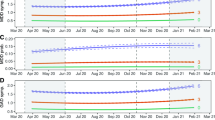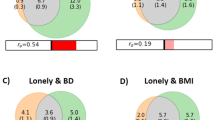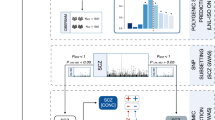Abstract
Major depression (MD) is a serious psychiatric illness afflicting nearly 5% of the world’s population. A large correlational literature suggests that loneliness is a prospective risk factor for MD; correlational assocations of this nature may be confounded for a variety of reasons. This report uses Mendelian Randomization (MR) to examine potentially causal associations between loneliness and MD. We report on analyses using summary statistics from three large genome wide association studies (GWAS). MR analyses were conducted using three independent sources of GWAS summary statistics. In the first set of analyses, we used available summary statistics from an extant GWAS of loneliness to predict MD risk. We used two sources of outcome data: the Psychiatric Genomics Consortium (PGC) meta-analysis of MD (PGC-MD; N = 142,646) and the Million Veteran Program (MVP-MD; N = 250,215). Finally, we reversed analyses using data from the MVP and PGC samples to identify risk variants for MD and used loneliness outcome data from UK Biobank. We find robust evidence for a bidirectional causal relationship between loneliness and MD, including between loneliness, depression cases status, and a continuous measure of depressive symptoms. The estimates remained significant across several sensitivity analyses, including models that account for horizontal pleiotropy. This paper provides the first genetically-informed evidence that reducing loneliness may play a causal role in decreasing risk for depressive illness, and these findings support efforts to reduce loneliness in order to prevent or ameliorate MD. Discussion focuses on the public health significance of these findings, especially in light of the SARS-CoV-2 pandemic.
This is a preview of subscription content, access via your institution
Access options
Subscribe to this journal
Receive 12 print issues and online access
$259.00 per year
only $21.58 per issue
Buy this article
- Purchase on Springer Link
- Instant access to full article PDF
Prices may be subject to local taxes which are calculated during checkout


Similar content being viewed by others
Data availability
The data used in this study comes from several sources. Genetic summary statistics for the loneliness instrument are available through the UK Biobank and by request to the authors. The PGC MD summary statistic data is publicly available: https://www.med.unc.edu/pgc/download-results/mdd/. The MVP MD summary statistic data is available on dbGaP via Study Accession: phs001672.v6.p1. MR source code is published on the Open Scientific Framework: https://osf.io/sc6we/.
Notes
The Wray et al. GWAS included UKB participants, and therefore the genetic instruments were first identified in a sample that included UKB participants. For the current sensitivity analysis, in an effort to maintain independent samples for the exposure and outcome data, we used the instruments identified by Wray et al. in the PGC-MDD exposure sample that does not include UKB participants.
References
Ferrari AJ, Somerville AJ, Baxter AJ, Norman R, Patten SB, Vos T, et al. Global variation in the prevalence and incidence of major depressive disorder: a systematic review of the epidemiological literature. Psychol Med. 2013;43:471–81.
Lim GY, Tam WW, Lu Y, Ho CS, Zhang MW, Ho RC. Prevalence of depression in the community from 30 countries between 1994 and 2014. Sci Rep. 2018;8:1–10.
Kessler RC, Berglund P, Demler O, Jin R, Koretz D, Merikangas KR, et al. The epidemiology of major depressive disorder: results from the National Comorbidity Survey Replication (NCS-R). Jama. 2003;289:3095–105.
Smith K. Mental health: a world of depression. Nature. 2014;515:180–1.
Choi KW, Stein MB, Nishimi KM, Ge T, Coleman JR, Chen C-Y, et al. An exposure-wide and Mendelian randomization approach to identifying modifiable factors for the prevention of depression. Am J Psychiatry. 2020;177:944–54.
Whisman MA, Sbarra DA, Beach SR. Intimate relationships and depression: searching for causation in the sea of association. Annu Rev Clin Psychol. 2021;17:233–58.
Choi KW, Chen C-Y, Stein MB, Klimentidis YC, Wang M-J, Koenen KC, et al. Assessment of bidirectional relationships between physical activity and depression among adults: a 2-sample mendelian randomization study. JAMA Psychiatry. 2019;76:399–408.
Herrman H, Patel V, Kieling C, Berk M, Buchweitz C, Cuijpers P, et al. Time for united action on depression: a Lancet–World psychiatric association commission. Lancet. 2022;399:957–1022.
Cacioppo S, Grippo AJ, London S, Goossens L, Cacioppo JT. Loneliness: clinical import and interventions. Perspect Psychol Sci. 2015;10:238–49.
Cacioppo, JT & Patrick, W. Loneliness: human nature and the need for social connection. New York: WW Norton & Company; 2008.
Beutel ME, Klein EM, Brähler E, Reiner I, Jünger C, et al. Loneliness in the general population: prevalence, determinants and relations to mental health. BMC Psychiatry. 2017;17:97.
Holt-Lunstad J, Robles TF, Sbarra DA. Advancing social connection as a public health priority in the United States. Am Psychol. 2017;72:517–30.
Killgore WD, Cloonan SA, Taylor EC, Dailey NS. Loneliness: a signature mental health concern in the era of COVID-19. Psychiatry Res. 2020;290:113117.
Bu F, Steptoe A, Fancourt D. Loneliness during a strict lockdown: trajectories and predictors during the COVID-19 pandemic in 38,217 United Kingdom adults. Soc Sci Med. 2020;265:113521.
Office of the Surgeon General. Our Epidemic of Loneliness and Isolation: The U.S. Surgeon General’s Advisory on the Health Efffects of Social Connection and Community. (2023).
Holt-Lunstad J, Perissinotto C. Social isolation and loneliness as medical issues. N Engl J Med. 2023;388:193–5.
Erzen E, Çikrikci Ö. The effect of loneliness on depression: a meta-analysis. Int J Soc Psychiatry. 2018;64:427–35.
VanderWeele TJ, Tchetgen EJT, Cornelis M, Kraft P. Prognostic significance of social network, social support and loneliness for course of major depressive disorder in adulthood and old age. Epidemiol Psychiatr Sci. 2018;27:266–77. (2014).
Heinrich LM, Gullone E. The clinical significance of loneliness: a literature review. Clin Psychol Rev. 2006;26:695–718.
Cacioppo JT, Hawkley LC, Thisted RA. Perceived social isolation makes me sad: 5-year cross-lagged analyses of loneliness and depressive symptomatology in the Chicago Health, aging, and social relations study. Psychol Aging. 2010;25:453–63.
Ebrahim S, Davey Smith G. Mendelian randomization: can genetic epidemiology help redress the failures of observational epidemiology? Hum Genet. 2008;123:15–33.
Yang YC, Boen C, Gerken K, Li T, Schorpp K, Harris KM. Social relationships and physiological determinants of longevity across the human life span. Proc Natl Acad Sci. 2016;113:578–83.
Murthy, VH & Murthy, VH. Together. New York: Harper Collins Publishers; 2020.
Turkheimer, E & Harden, K. Behavior genetic research methods: testing quasi-causal hypotheses using multivariate twin data. In: Reis, HT & Judd, CM, editors. Handbook of research methods in personality and social psychology. New York; Cambridge University Press 2014.159-87.
Davey Smith G, Ebrahim S. ‘Mendelian randomization’: can genetic epidemiology contribute to understanding environmental determinants of disease? Int J Epidemiol. 2003;32:1–22.
Matthews T, Danese A, Wertz J, Odgers CL, Ambler A, Moffitt TE, et al. Social isolation, loneliness and depression in young adulthood: a behavioural genetic analysis. Soc Psychiatry Psychiatr Epidemiol. 2016;51:339–48.
Davey Smith G, Hemani G. Mendelian randomization: genetic anchors for causal inference in epidemiological studies. Hum Mol Genet. 2014;23:R89–R98.
Sanderson E, Glymour MM, Holmes MV, Kang H, Morrison J, Munafò MR, et al. Mendelian randomization. Nat Rev Methods Prim. 2022;2:6.
Lawlor DA, Harbord RM, Sterne JA, Timpson N, Davey Smith G. Mendelian randomization: using genes as instruments for making causal inferences in epidemiology. Stat Med. 2008;27:1133–63.
Rødevand L, Bahrami S, Frei O, Lin A, Gani O, Shadrin A, et al. Polygenic overlap and shared genetic loci between loneliness, severe mental disorders, and cardiovascular disease risk factors suggest shared molecular mechanisms. Transl Psychiatry. 2021;11:1–11.
Abdellaoui A, Sanchez-Roige S, Sealock J, Treur JL, Dennis J, Fontanillas P, et al. Phenome-wide investigation of health outcomes associated with genetic predisposition to loneliness. Hum Mol Genet. 2019;28:3853–65.
Sbarra, DA. Social integration and sleep disturbance: a gene-environment interaction study. Collabra. 2016;2:1.
Abdellaoui A, Chen HY, Willemsen G, Ehli EA, Davies GE, Verweij KJ, et al. Associations between loneliness and personality are mostly driven by a genetic association with neuroticism. J Personal. 2019;87:386–97.
Boomsma DI, Cacioppo JT, Muthén B, Asparouhov T, Clark S. Longitudinal genetic analysis for loneliness in Dutch twins. Twin Res Hum Genet. 2007;10:267–73.
Wootton RE, Greenstone HS, Abdellaoui A, Denys D, Verweij KJ, Munafò MR, et al. Bidirectional effects between loneliness, smoking and alcohol use: evidence from a Mendelian randomization study. Addiction. 2021;116:400–6.
Day FR, Ong KK, Perry JR. Elucidating the genetic basis of social interaction and isolation. Nat Commun. 2018;9:1–6.
Goossens L, Van Roekel E, Verhagen M, Cacioppo JT, Cacioppo S, Maes M, et al. The genetics of loneliness: linking evolutionary theory to genome-wide genetics, epigenetics, and social science. Perspect Psychol Sci. 2015;10:213–26.
Burgess S, Smith GD, Davies NM, Dudbridge F, Gill D, Glymour MM, et al. Guidelines for performing Mendelian randomization investigations: update for summer 2023. Wellcome Open Res. 2023;4:186.
Morrison J, Knoblauch N, Marcus JH, Stephens M, He X. Mendelian randomization accounting for correlated and uncorrelated pleiotropic effects using genome-wide summary statistics. Nat Genet. 2020;52:740–7.
Wray NR, Ripke S, Mattheisen M, Trzaskowski M, Byrne EM, Abdellaoui A, et al. Genome-wide association analyses identify 44 risk variants and refine the genetic architecture of major depression. Nat Genet. 2018;50:668–81.
Levey, DF, Stein, MB, Wendt, FR, Pathak, GA, Zhou, H, Aslan, M, et al. Bi-ancestral depression GWAS in the Million Veteran Program and meta-analysis in > 1.2 million individuals highlight new therapeutic directions. Nat Neurosci. 2021;7:1–10.
Elsworth, BL, Lyon, MS, Alexander, T, Liu, Y, Matthews, P, Hallett, J, et al. The MRC IEU OpenGWAS data infrastructure. bioRxiv (2020).
Gaziano JM, Concato J, Brophy M, Fiore L, Pyarajan S, Breeling J, et al. Million Veteran Program: a mega-biobank to study genetic influences on health and disease. J Clin Epidemiol. 2016;70:214–23.
Löwe B, Kroenke K, Gräfe K. Detecting and monitoring depression with a two-item questionnaire (PHQ-2). J Psychosom Res. 2005;58:163–71.
VanderWeele TJ, Tchetgen EJT, Cornelis M, Kraft P. Methodological challenges in mendelian randomization. Epidemiology. 2014;25:427–35.
Verbanck M, Chen C-Y, Neale B, Do R. Detection of widespread horizontal pleiotropy in causal relationships inferred from Mendelian randomization between complex traits and diseases. Nat Genet. 2018;50:693–8.
Burgess S, Thompson SG. Multivariable Mendelian randomization: the use of pleiotropic genetic variants to estimate causal effects. Am J Epidemiol. 2015;181:251–60.
Bowden J, Davey Smith G, Burgess S. Mendelian randomization with invalid instruments: effect estimation and bias detection through Egger regression. Int J Epidemiol. 2015;44:512–25.
Burgess S, Thompson SG. Interpreting findings from Mendelian randomization using the MR-Egger method. Eur J Epidemiol. 2017;32:377–89.
Bowden J, Davey Smith G, Haycock PC, Burgess S. Consistent estimation in Mendelian randomization with some invalid instruments using a weighted median estimator. Genet Epidemiol. 2016;40:304–14.
Zhao Q, Wang J, Hemani G, Bowden J, Small DS. Statistical inference in two-sample summary-data Mendelian randomization using robust adjusted profile score. Ann Stat. 2020;48:1742–69.
Bowden J, Del Greco M F, Minelli C, Davey Smith G, Sheehan NA, Thompson JR. Assessing the suitability of summary data for two-sample Mendelian randomization analyses using MR-Egger regression: the role of the I 2 statistic. Int J Epidemiol. 2016;45:1961–74.
Hemani G, Bowden J, Davey Smith G. Evaluating the potential role of pleiotropy in Mendelian randomization studies. Hum Mol Genet. 2018;27:R195–R208.
Cacioppo JT, Hughes ME, Waite LJ, Hawkley LC, Thisted RA. Loneliness as a specific risk factor for depressive symptoms: cross-sectional and longitudinal analyses. Psychol Aging. 2006;21:140–51.
Kraav S-L, Lehto SM, Junttila N, Ruusunen A, Kauhanen J, Hantunen S, et al. Depression and loneliness may have a direct connection without mediating factors. Nordic J Psychiatry. 2021;7:1–5.
Lo M-T, Hinds DA, Tung JY, Franz C, Fan C-C, Wang Y, et al. Genome-wide analyses for personality traits identify six genomic loci and show correlations with psychiatric disorders. Nat Genet. 2017;49:152–6.
Andreu-Bernabeu A, Diaz-Caneja CM, Costas J, De Hoyos L, Stella C, Gurriaran X, et al. Polygenic contribution to the relationship of loneliness and social isolation with schizophrenia. Nat Commun. 2022;13:51.
Mencacci C, Salvi V. Expected effects of COVID-19 outbreak on depression incidence in Italy. J Affect Disord. 2021;278:66–67.
Bueno-Notivol J, Gracia-García P, Olaya B, Lasheras I, López-Antón R, Santabárbara J. Prevalence of depression during the COVID-19 outbreak: a meta-analysis of community-based studies. Int J Clin Health Psychol. 2021;21:100196.
Qualter P, Vanhalst J, Harris R, Van Roekel E, Lodder G, Bangee M, et al. Loneliness across the life span. Perspect Psychol. Sci. 2015;10:250–64.
Cacioppo JT, Hawkley LC. Perceived social isolation and cognition. Trends Cogn Sci. 2009;13:447–54.
Bangee M, Harris RA, Bridges N, Rotenberg KJ, Qualter P. Loneliness and attention to social threat in young adults: findings from an eye tracker study. Personal Individ Differ. 2014;63:16–23.
Allen K-A, Kern ML, Rozek CS, McInerney DM & Slavich GM. Belonging: a review of conceptual issues, an integrative framework, and directions for future research. Aust J Psychol. 2021;1:1–16.
Hughes ME, Waite LJ, Hawkley LC, Cacioppo JT. A short scale for measuring loneliness in large surveys. Res Aging. 2004;26:655–72.
Darrous L, Mounier N, Kutalik Z. Simultaneous estimation of bi-directional causal effects and heritable confounding from GWAS summary statistics. Nat Commun. 2021;12:7274.
Minică CC, Dolan CV, Boomsma DI, de Geus E, Neale MC. Extending causality tests with genetic instruments: an integration of Mendelian randomization with the classical twin design. Behav Genet. 2018;48:337–49.
de Vries LP, Baselmans BM, Luykx JJ, de Zeeuw EL, Minică C, de Geus EJ, et al. Genetic evidence for a large overlap and potential bidirectional causal effects between resilience and well-being. Neurobiol Stress. 2021;14:100315.
Funding
DAS was partialy supported by a grant from the National Institute of Aging (R01AG078361-01). KWC was partially supported by a Kaplen Fellowship on Depression from the Harvard Medical School, a NARSAD Young Investigator Grant from the Brain & Behavior Research Foundation, and funding from the National Institute of Mental Health (K08MH127413). DFL was supported by a NARSAD Young Investigator Grant from the Brain & Behavior Research Foundation. REW is supported by a postdoctoral fellowship from the South-Eastern Regional Health Authority (2020024).
Author information
Authors and Affiliations
Contributions
DAS and YCK had full access to all the study data and take full responsibility for the integrity and accuracy of the reporting. MBS and JG contributed equally to the report. Concept and design: DAS, FAR, YCK. Acquisition and interpretation of data: DAS, FAR, YCK, KWC, JLT, DFL, MBS, JLT. Drafting the manuscript: DAS, FAR, YCK. Revision of the manuscript: All authors. Statistical analyses: DAS, FAR, YCK. Administrative, technical, or material support: FAR. Approval of final manuscript: All authors.
Corresponding author
Ethics declarations
Competing interests
MBS in the past 3 years has received consulting income from Actelion, Acadia Pharmaceuticals, Aptinyx, Bionomics, BioXcel Therapeutics, Clexio, EmpowerPharm, GW Pharmaceuticals, Janssen, Jazz Pharmaceuticals, and Roche/Genentech. He has also received research support from NIH, Department of Veterans Affairs, and the Department of Defense. He is on the scientific advisory board for Brain and Behavior Research Foundation and the Anxiety and Depression Association of America. Dr. Stein has stock options in Oxeia Biopharmaceuticals and Epivario.
Additional information
Publisher’s note Springer Nature remains neutral with regard to jurisdictional claims in published maps and institutional affiliations.
Supplementary information
Rights and permissions
Springer Nature or its licensor (e.g. a society or other partner) holds exclusive rights to this article under a publishing agreement with the author(s) or other rightsholder(s); author self-archiving of the accepted manuscript version of this article is solely governed by the terms of such publishing agreement and applicable law.
About this article
Cite this article
Sbarra, D.A., Ramadan, F.A., Choi, K.W. et al. Loneliness and depression: bidirectional mendelian randomization analyses using data from three large genome-wide association studies. Mol Psychiatry 28, 4594–4601 (2023). https://doi.org/10.1038/s41380-023-02259-w
Received:
Revised:
Accepted:
Published:
Issue Date:
DOI: https://doi.org/10.1038/s41380-023-02259-w



